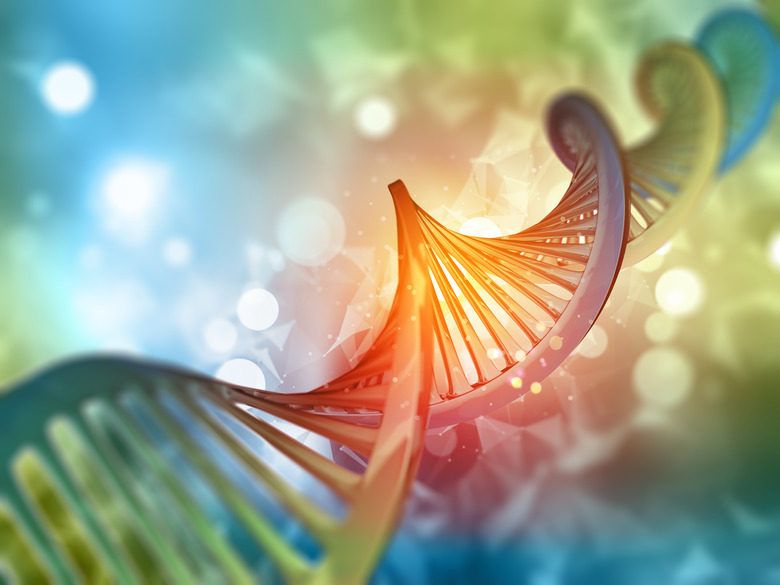The Importance Of DNA In The Human Cell
The recognition that DNA carries the information blueprint for all living organisms, and the mechanisms that translate the DNA code into the stuff of life, stands as one of the great discoveries of modern science. From the simplest microorganisms to the giant trees and animals that inhabit the Earth, all rely on DNA for their existence. Using far fewer biological "letters" than the 26-letter English alphabet, DNA spells out the instructions for how organisms live, reproduce, metabolize, mature and eventually die.
DNA, the Code of Life
DNA, the Code of Life
DNA is a complex, long-chained molecule that encodes the genetic characteristics of a living organism. In most plants and animals, DNA is packaged with ribonucleic acid and proteins into compact structures called chromosomes that reside in the cell nucleus. Almost all human cells have 23 pairs of chromosomes, one set from each parent. DNA sections called genes indirectly code for proteins, which give structure and function to human bodies. The choice of which genes operate in which cells determines the cell's type: brain, liver, skin and all others.
Reproduction
Reproduction
In sexual reproduction, humans create special cells, called gametes, that contain but one set of 23 chromosomes. During fertilization, the father's DNA unites with that of the mother to create a new, unique set of 46 chromosomes. This is how an ancestor's traits are passed down to offspring. One particular chromosome in a gamete determines the gender of offspring. That chromosome can be the X or the Y: two X's create a female, while XY produces a male. As the fertilized egg begins to divide, different genes control how cells differentiate from each other, creating the various human tissues, organs and systems.
Biochemistry
Biochemistry
DNA codes for all the cell proteins that make life possible. The cell transcribes DNA into RNA, which it then translates into proteins. These include the enzymes, hormones and structural proteins that each cell needs. Complex biochemical feedback loops determine which DNA genes are expressed. Through cellular biochemical pathways, genes control the shape of your nose and the size of your ears. If a gene is incorrectly coded, say due to a mutation in the DNA molecule, you may suffer from birth defects, such as a cleft palate, or genetic diseases including cystic fibrosis and Down's syndrome.
Life and Death
Life and Death
DNA is essential for the life of the human cell, yet it can fragment, leading to cell death. Science has not fully unraveled this mystery — scientists do not know whether DNA is programmed to self-destruct. Thirty-seven genes of nonchromosomal DNA reside in human mitochondria, the cell's power plants. This DNA codes for important RNA molecules, some of which produce enzymes required for metabolism. Mutations of mitochondrial DNA can cause newborns to die. Not all mutations are bad — evolution is essentially a long story of beneficial DNA mutations that have transformed the simplest one-cell organism into higher forms of life, including human beings.
Cite This Article
MLA
Finance, Eric Bank, MBA, MS. "The Importance Of DNA In The Human Cell" sciencing.com, https://www.sciencing.com/importance-dna-human-cell-19447/. 26 April 2018.
APA
Finance, Eric Bank, MBA, MS. (2018, April 26). The Importance Of DNA In The Human Cell. sciencing.com. Retrieved from https://www.sciencing.com/importance-dna-human-cell-19447/
Chicago
Finance, Eric Bank, MBA, MS. The Importance Of DNA In The Human Cell last modified August 30, 2022. https://www.sciencing.com/importance-dna-human-cell-19447/
